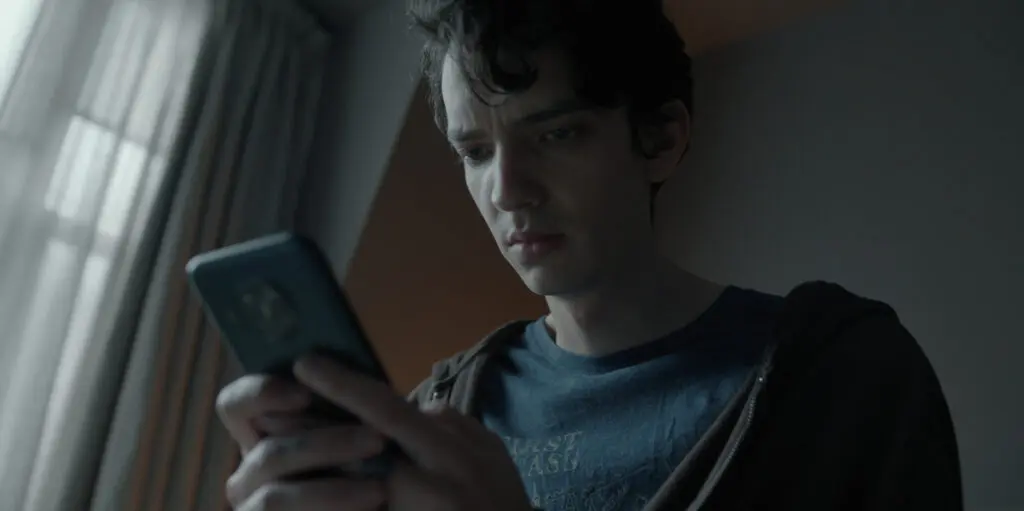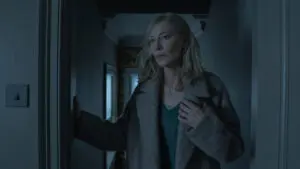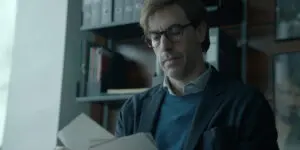Summary
Disclaimer becomes bleaker than ever in Episode 5 and is revealing itself as not just an excellently crafted show but also a quietly remarkable one.
I’ll happily admit that I can’t stand the character of Nicholas in Disclaimer. Honestly — who does he think he’s talking to? If I spoke to my mum as he does in Episode 5, the first of the season that Apple TV+ has deigned to release on its own, she’d have punted me into orbit. And he’s acting this way before he finds out the rather uncomfortable truth that his mother is the “whore” he hates so much in The Perfect Stranger.
It’s a testament to how excellent this show is, and how tightly wound this episode is, that I caught myself feeling for Nicholas rather deeply by the end. I’d spent almost an hour driven near-mad by him haunting his empty house, his spindly legs hanging out of his too-short shorts like a bird’s dangling from a nest. But the sight of him in a smack den covered in his vomit, sobbing and raging at his loveless mother’s dark secrets, got me on his side. Almost, anyway.
This is the point of “V”, I suspect. Nicholas is a coddled nitwit, but he’s too stupid to qualify as a real villain. The depth of his pain is a reminder that he’s a puppet on the strings of Stephen, who toys with him all episode behind the filtered photographs of Jonathan Brigstocke’s Instagram account. Stephen, while his anger might be valid, is a villain. He toys with Nicholas’s vulnerabilities and anxieties, stokes his peacocking, and indulges his flights of fancy — a “road trip across America” that was a five-day Disneyland stay; the “few girls” he has supposedly slept with — to destroy him emotionally.
All the while, he watches a cockroach trapped under a glass painfully expire, the joy he feels at its torment visible on his face. Stephen takes the same pleasure in waterboarding Nicholas with a stream of his mother’s nudes. In any other show, he’d be a serial killer.
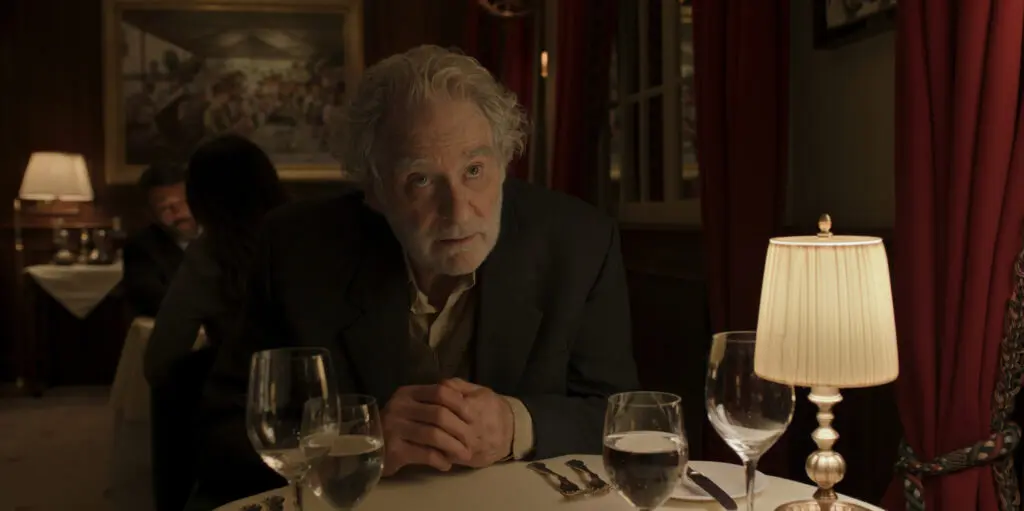
Kevin Kline as Stephen Brigstocke (2001) in “Disclaimer” | Image via Apple TV+
You have to wonder what the end of all this will be. In the space of a single episode — the first not to include any flashbacks, as it happens — Stephen has almost certainly cost Catherine her job and her relationship with her son. To further twist the knife, he grooms Robert as an ally, playing the doddering old man card to engender sympathy. At one point Catherine turns up at Stephen’s house and bellows things through his letterbox, including, tellingly, “You’ve won.” And she’s right. So what’s next?
It’s a worthwhile question. Given the increasing glee Stephen is experiencing in tormenting this family, I can’t imagine Catherine’s personal and professional ruin will satisfy him. Is he determined to drive her to suicide? Or to drive Robert or Nicholas to murder? Or is he like a dog chasing a car, unsure of what it’ll do when it finally catches one? Has the thrill of the chase, or the torture, become the point?
In the premiere, I’m not sure I’d have bought this sadism angle. I might not have even gone in for it in Episode 2 when things became a bit clearer. But I’m getting there. Watch how Stephen conducts himself in Disclaimer Episode 5, the ways that are obvious and that aren’t. The details of the Instagram scheme are meticulous. His manipulation of Nicholas is sinister, but pay attention to the way his language changes when he gets excited about giving himself away. The rules of impersonating a teenager — slang, acronyms, no punctuation — give way to the lettered approach of a teacher. Stephen reveals himself not just through the photos of Catherine, but in the way he speaks.
Contrast this with Catherine’s mother, Helen, who is of a similar age. We see a fair amount of Helen in “V” because Catherine has moved back in with her temporarily. Helen’s losing it a bit, but she’s a sweet old lady who still has the presence of mind to take Catherine a glass of water and a packet of tablets because she knows she’s struggling. At one point, Catherine tells her sleeping mother everything — most of her testimony is conveniently muted, Indira Varma’s narration taking over — about the Italy trip. As she lightly snores, Catherine thinks to herself that how she looks in that moment, quiet and peaceful and vulnerable, is how she’ll look when she’s dead. It’s a thought bleak enough to qualify for a line in a Chuck Palahniuk novel, but I don’t think it’s an accident. Helen is the prototypical aging parent. Stephen, by comparison, exhibits none of the warmth or the vulnerability.
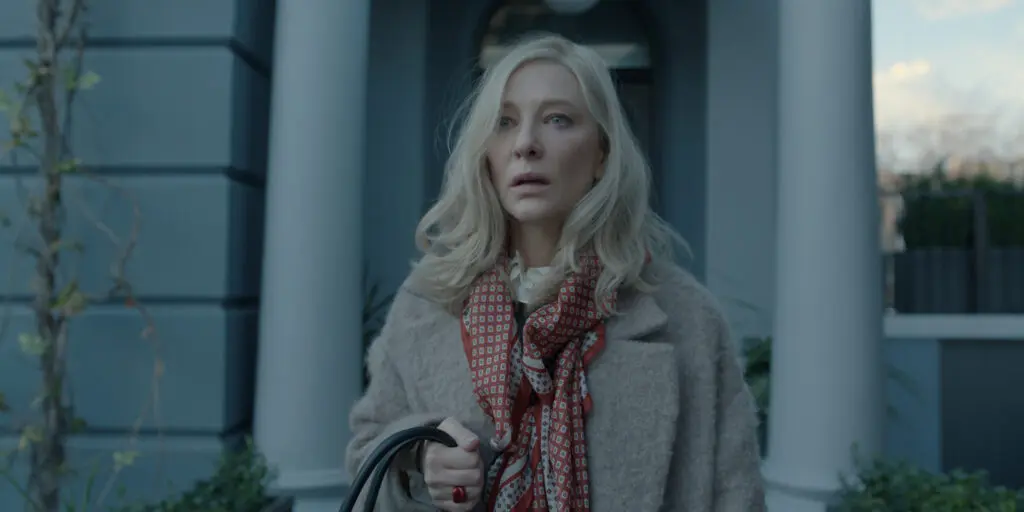
Cate Blanchett as Catherine Ravenscroft (2024, ‘Present Day’) in “Disclaimer” | Image via Apple TV+
In my recap of the previous episodes, I posited the theory that everything we’ve seen in the flashbacks is cribbed from the text of The Perfect Stranger and that a lot of it might well be rubbish. I believe this even more strongly now. All of our information about what happened in Italy — incredibly intimate sexual details, Jonathan heroically saving Nicholas, Catherine devilishly leaving Jonathan to die — has come from second-hand sources. Nancy couldn’t have known any of this when she was writing the book. And yet it has consistently been presented as fact, the flashbacks matching up one-to-one with the text.
There’s an old apocryphal tale about a depressed man waiting to receive a call about whether or not he has lost his job. He’s told that if he is still employed, his phone will ring at exactly 6 pm. If the phone doesn’t ring, he’s fired. At 6:01 pm, when the phone hasn’t rung, he goes up to the roof of his apartment building and jumps to his death. As he’s falling past his window, he hears the phone ringing.
This is obviously nonsense since the only person who could have recounted this series of events is now splattered on the pavement. The same is true here. Jonathan and Catherine are the only two people who know what really happened in Italy; one of them is dead, and the other hasn’t said a word about it since. Given how dark Disclaimer is becoming, and how many lives may ultimately be swallowed by that darkness, is the real tragedy of this show going to be that it’s all under false pretenses?
RELATED:

